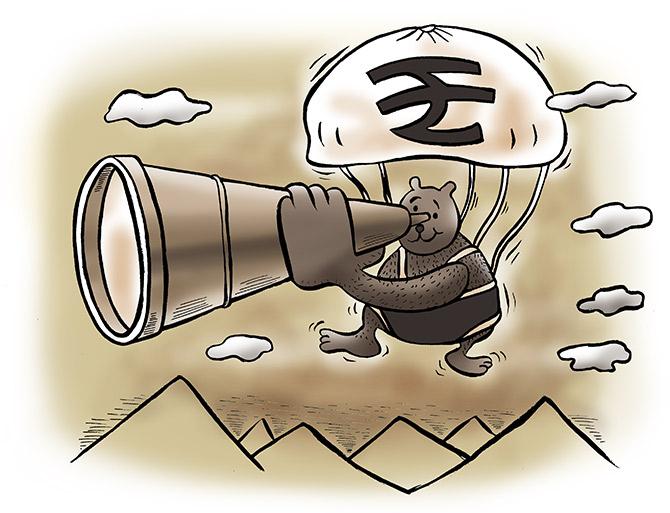Historically low valuations because of a sharp correction in the preceding three months had provided investors buying comfort. However, most PSUs have come off this month, even as the benchmark Sensex has climbed to record levels.
Illustration: Uttam Ghosh/Rediff.com

Investor interest in the stocks of public sector undertakings (PSUs) - which had reached dizzy heights in the last two months - seems to be fizzling out as they reassess the feasibility of their expectations.
During the two months ending October 31, the Nifty PSE (public sector enterprise) index had rallied 14 per cent, outperforming the benchmark Nifty, which rose 7.7 per cent.
Some individual PSUs, such as General Insurance Corp of India (GIC RE), New India Assurance, and Bharat Petroleum Corp (BPCL), had jumped more than 50 per cent each.
Market players say privatisation buzz, hopes of hefty dividends post tax cut, and buyback arbitrage had kept many of the PSU counters ticking.
Also, historically low valuations because of a sharp correction in the preceding three months had provided investors buying comfort.
However, most PSUs have come off this month, even as the benchmark Sensex has climbed to record levels.
So far this month, the Nifty PSE index is down 3.2, whereas the Nifty has made a small increase of 0.3 per cent.
“Many PSUs had rallied on expectations of privatisation. As there has been no material, some of them have corrected. One can expect another round of buying if something concrete happens on that front,” said Abhimanyu Sofat, head of research, IIFL.
Market players say Moody’s decision to lower India’s credit rating outlook could be weighing on the PSU pack.
“If you face a possibility of a rating downgrade, it means you have fiscal pressure.
"Therefore, liquidity support from the government given to some of the PSUs could be constrained,” said Sofat.
Also, market players the rating outlook change will now force the government to be aggressive with the divestment.
“In the remaining four months of this financial year, we could see disinvestment by the government in some of the large PSUs.
"This will increase the paper supply and keep stock prices depressed,” said an analyst on the recent softness in PSU stocks.
While the stake sale overhang is always there for PSUs, expectations of an outright sale or privatisation have gathered steam, boosting stock prices.
A core group of secretaries on September 30 approved disinvestment in five PSUs, including BPCL.
Subsequent news reports speculated that many foreign companies, including Saudi Aramco and Rosneft, are in talks to bid for the government's stake in BPCL.
Its share price rose 48 per cent in September and October but since November, it fell 1.7 per cent.
Despite recent gains, the PSU pack looks quite attractive in terms of valuations, say analysts.
The Nifty PSE is trading at trailing 12-month price-to-earnings ratio of 8.64 times, as against 25 times for the Nifty.
“As long as their business models are robust, there is no leveraging, have reasonable cash reserves, and are available on the single-digit price to equity, stocks in that segment have opportunities,” said Chokkalingam G, founder of Equinomics Research & Advisory.












 © 2025
© 2025